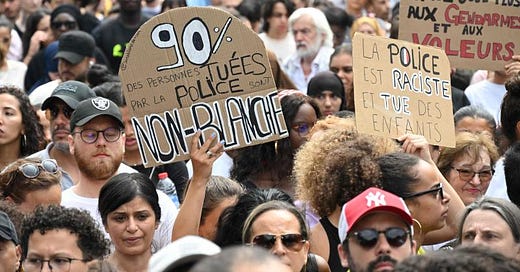Dear readers, friends and newcomers,
as I write these words, most of you must have heard about the situation in Paris and most of France’s large cities.
The death of a 17-year-old young man, now known as Nahel M, on Tuesday, triggered a few nights of violence and clashes with police, on housing estates in several towns.
This moment of excessive police response and violence was filmed, then the video, posted on social networks, went viral and caused protests in many working-class neighbourhoods. Some turned more violent, especially overnight.
His family led a march on Thursday in his memory, calling for change in the police, and in the victimised suburban areas.
Nahel’s neighbours said he was from a family of Algerian and Moroccan origins.
“It’s always the same people, the same ethnicities – that’s what’s bringing everyone out to protest and that’s why the whole world is talking about this,” Linda, 40, told The Guardian the following day.
Linda had dropped her three-year-old daughter at school on Tuesday before witnessing the aftermath of the police shooting, metres from her child’s school.
“If you are slightly of colour, or from an immigrant background, you’ll be judged differently. There are two different justice systems, that is what is not working,” she added.
Linda, who is of a mixed race background herself with an Algerian father, said: “People are very angry and very afraid.”
*
I've been doing so much of what I'm doing because of similar events, especially the protests and riots of 2005.
Our public international news channel, France 24, was launched in the aftermath of the autumn 2005, to bring better coverage of France abroad... And I worked for them the first three years, 2006, 2007 and 2008.
I worked with a filmmaker for years on a potential film on police brutality in France. I wrote my own script on a close angle. I help with the research on films about the USA. I lived in the US myself, then the UK, then Kenya and Central African Republic, writing about the suburbs, anti-racist protests, the life of immigrants, post-colonial roots of police violence, and activism, in these countries.
I now live near Nanterre, I passed my school exams there 25 years ago. I am from the same origins as Nahel, and couldn't be sadder that nothing improved with French police in all this time...
As journalists, we have a responsibility to help people understand.
And the last thing we need now here in Nanterre, Colombes, Clichy-sous-Bois... is more police.
I do feel that Nahel is our George Floyd.
As James Baldwin and other African American writers said, the Algerians are the “niggers” of France.
We need our #TheseLivesMatter moment.
The march in Nanterre and elsewhere should be peaceful and a sign of a demand for change. And first, change in the police.
As we all deal with the aftermath of the events, and as a busy journalist covering France but also and mostly African news, I just want to share some important and relavant links for those who want to understand the situation more in depth.
*
Today, Friday, the United Nations said that France must 'seriously address' police racism.
UN human rights office spokeswoman Ravina Shamdasani spoke out against 'deep issues of racism and discrimination in law enforcement' at a media briefing in Geneva.
"We are concerned by the killing of a 17-year-old of North African descent by police in France on Tuesday," she added.
"We note that an investigation has been launched into alleged voluntary homicide. This is a moment for the country to seriously address the deep issues of racism and discrimination in law enforcement."
Meanwhile, French President Emmanuel Macron led a crisis meeting of ministers on Friday, June 30 too, after a third night of protests saw cars torched, shops ransacked and hundreds arrested. But he ignored the UN recommendation for now.
"We also emphasise the importance of peaceful assembly," Shamdasani also said. "We call on the authorities to ensure use of force by police to address violent elements in demonstrations always respects the principles of legality, necessity, proportionality, non-discrimination, precaution and accountability. Any allegations of disproportionate use of force must be swiftly investigated."
*
For more on the history of immigration and the colonial legacy in the relations between the police and the poor suburbs, you can read these articles:
The colonial roots of French policing cannot be ignored
How Colonialism Shaped Policing in France
France: Police Violence as Part of Colonial History
Or watch 'How will France address police brutality?' On Al Jazeera's YouTube Channel | Inside Story'
For more on the colonial Algerian background, my article for Al Jazeera on Algerians in France, a more personal history, written in October 2021, and the conversation on the American public radio NPR that followed.
Thanks for reading, as always, and I welcome your remarks, questions, and marks of interest.
Wherever you are, stay safe,
melissa
-
Melissa Chemam
Journalist & Writer



